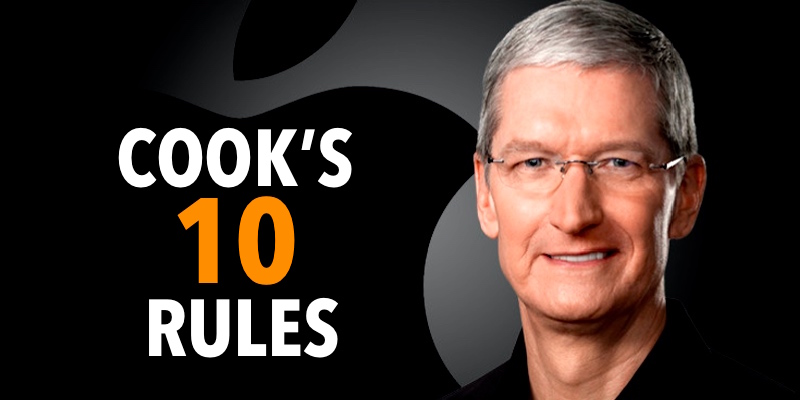In October 2011 Steve Jobs, the glorified CEO and co-founder of Apple, passed away. With his passing, came a new type of leadership to Apple, one that has become something different.
Any time someone has to step into fill big shoes, as did Cook, the job as a leader increases in difficulty from the on-set; Not only does the leader need to lead the company/venture to success, but in addition has to calm all the nay-sayers and doubters.
To quite an extent, Tim Cook has succeeded on both fronts, and naturally there are some lessons to be learned from that success.

Here are 10 success lessons Tim Cook – “Apple CEO” for entrepreneurs,
1. Don’t fear the shadow
When Cook replaced Jobs, he knew it was no small task and knew what Jobs leadership style was.
Tim Cook did not try to replicate the leadership style of Steve Jobs, and we don’t know if trying ever crossed his mind. What we do know, is that Cook, despite the shadow that was cast on him from Jobs’ legacy, decided to be the only leader he knew how to be – himself.
Could Cook have tried to do things a bit more like Jobs? Yes. Would anyone have blamed him? No. Is it good he added to Apple’s culture his own bit of flavor? It sure seems like it, and more than likely, share holders would agree.
2. Take risks
The life of a leader is not an easy one. At times leaders must make extremely difficult decisions that can affect the lives of those around them. Although it’s difficult, you must be able to trust in your ability to take risks.
Tim Cook understands he must take risks in order to succeed. He believes that “[w]e take risks knowing that risks will sometimes result in failure, but without the possibility of failure there is no possibility of success.”
3. Trust others around you
Tim Cook is known as a leader who will trust the opinions and voices of the team he surrounds himself with.
He is fortunate to have many top executives that can help share the workload of the business. He understands these individuals are successful people with innovative and brilliant ideas, and will often allow these executives to take the lead.
Part of being a leader is understanding that you don’t know everything, and handing some of the workload to others on your team will go a long way in helping you become a successful leader.
4. Be humble
Never forget where you came from. Tim Cook manages to find the time to visit his Apple stores and engage with his customers, either face-to-face or by reading their emails.
It’s easy to get swept away when you are CEO of the biggest company in the world and it’s important to keep yourself grounded.
During the interview Tim Cook said, “Not allowing yourself to become insular is very important–maybe the most important thing, I think, as a CEO.” Staying humble will give you the respect of your employees and is a quality that is necessary to becoming a great leader.
5. Transparency is key
Cook knew transparency would be key. With harsh criticism about the standards of Apple’s global employees (especially through their manufacturing partners at Foxconn), Cook opened the doors and invited the world to see how Apple’s operations really worked. By doing this, he not only created goodwill around the company, but set industry standards for other manufacturers.
“Our transparency in supplier responsibility is an example of recognizing that the more transparent we are, the bigger difference we would make,” Cook says. “We want to be as innovative with supply responsibility as we are with our products. That’s a high bar. The more transparent we are, the more it’s in the public space.”
6. Admit you’re wrong
Ultimately, Cook’s advice for entrepreneurs and CEOs is advice that’s pretty helpful for anyone, really.
“So many people, particularly, I think, CEOs and top executives, they get so planted in their old ideas, and they refuse or don’t have the courage to admit that they’re now wrong,” he says. “Maybe the most under appreciated thing about Steve was that he had the courage to change his mind. And you know—it’s a talent. It’s a talent.”
7. Do what you do and do it well
Apple is a company that is built around doing what they do and doing it well. It may be shocking to believe, but Apple really only creates a few products.
Tim Cook stresses that this focus is a key to Apple’s continued success. “I mean, if you really look at it, we have four iPods.
We have two main iPhones. We have two iPads, and we have a few Macs. That’s it.” Mr. Cook is patient and understands that new and unique ideas will come. In the meantime, Apple focuses on improving its foundation and the products people love.
8. You change the course gradually
Steve was fond of producing great ‘i’ products – either it was an iMac or an iPhone or an iPod or an iPad, all began with ‘i’. Even different services of Apple were names as iCloud or iMessage, but it is no more the case. Now we have Apple Watch, not an iWatch, we have Apple Pencil not an iPencil, and there are reports about the Apple Car but not an iCar.
There is no difference in the ‘iProducts’ and the Apple Products, but one can understand easily that there is a change not only in the thinking but also in the leadership of the company.
9. Write your own rules
If you truly want to excel as a leader you must write your own rules. You will struggle to find continued success if you lead based on the confines of a textbook. You will rarely find real life scenarios and problems following those in textbooks.
During a Q & A at Duke University, Tim Cook mentioned you must “write your own rules”. If you do everything in a formulated manner, then the best you can do is reach the same position as everybody else. It is a strong lesson in leadership, knowing when to follow the rules and when to throw them away.
10. Diversity is important
The idea behind this philosophy is that people bring lots of different experiences to the table, and companies that can harness the most amount of creative experiences will be more innovative in their approach to business. Cook very explicitly recognizes that fact, and has made diversity a cornerstone of his management philosophy.
“We want diversity of thought,” he says. “We want diversity of style. We want people to be themselves. It’s this great thing about Apple. You don’t have to be somebody else. You don’t have to put on a face when you go to work and be something different.
But the thing that ties us all is we’re brought together by values. We want to do the right thing. We want to be honest and straightforward. We admit when we’re wrong and have the courage to change.”




